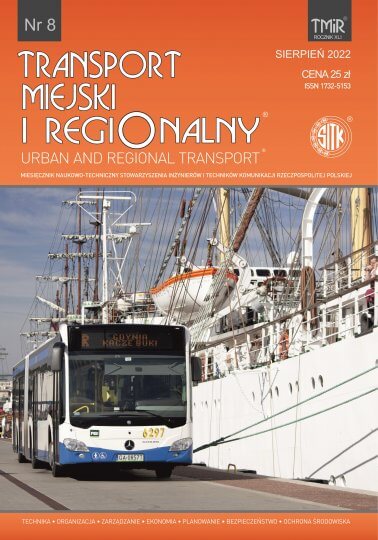 Hubert Kołodziejski, Olgierd Wyszomirski
Hubert Kołodziejski, Olgierd Wyszomirski
30 years of operation of the Municipal Transport Authority in Gdynia
Abstract: The Municipal Transport Authority in Gdynia (ZKM) has been organizing public transport services in part of the Gdańsk Bay Metropolis for 30 years. The separation of the organizational activity from the transport activity allowed for the introduction of competition in transport services to Gdynia’s public transport.
These services are provided by operators owned by the Gdynia Commune and by private operators. The basis of ZKM’s organizational activity is marketing research on the demand, preferences and transport behavior of residents. On this basis, ZKM develops a transport offer that is systematically optimised. During the period of operation of ZKM, Gdynia’s public transport evolved in accordance with the sustainable development strategy. There was a strong development of trolleybus transport based on vehicles covering part of the route without a catenary. Buses powered by compressed natural gas and electric buses have been put into operation. In the transport offer of ZKM, services provided by midibuses and minibuses as well as services of a special nature occupy a suitable place. An important element of the transport offer is the tariff, which has been systematically reconstructed in order to adapt to the changing conditions of the functioning of collective urban transport, in particular economic and financial ones. The condition for providing passengers with services of appropriate quality is constant supervision and regulation of vehicle traffic by ZKM. Customer service plays an important role in ZKM’s operations. ZKM also dealt with the transport education of children and youth. Gdynia’s collective urban transport organized by ZKM was highly rated by residents and experts. In the year of the 30th anniversary, ZKM faces new challenges in a situation of difficult external conditions for the functioning of this unit.
Keywords: urban transport, marketing research, transport offer, transport services
Robert Tomanek
The process of moving away from the market model of functioning of urban collective transport
Abstract: The beginning of the last decade of the 20th century was a time of liberalization in the world economy, as well as in Poland. In particular, it concerned the marketization of municipal services, which in Poland was related to the reconstruction of local government institutions. Marketization also covered public transport in cities. At the beginning of the 1990s, municipal transport boards were created, which were units managing the markets of urban collective transport. The essence of this model was the separation of regulations from operator services and competition between operators for orders from the municipal transport authority. The basic condition for the effectiveness of this solution is the independence of operators ensured by the privatization of municipal entities and opening the market to independent operators. Unfortunately, already at the beginning of the transformation, these assumptions were not met – in particular, it concerns the abandonment of privatization and too slow opening of markets. Although the introduction of this model improved the efficiency and quality of services provided, limiting the depth of changes reduced the potential effects.
Keywords: urban transport, public transport, transport market
Michał Wolański
Assessment of the effectiveness of Polish urban mobility policies
Abstract: Since 2013, the strategic documents of the Polish government set a goal of approximately 30% increase in the number of public transport passengers within a decade, as a measurable goal of sustainable mobility policy, but in practice this indicator changes only slightly, rather with a downward trend. The article presents the conditions for achieving such an increase. Based on analyzes of the volatility of the number of passengers in Polish cities in 2009-2017, the author indicates that this requires about 30-40% expansion of the transport offer and an increase in operating expenditures on a national scale by PLN 1-1.2 billion annually. Unfortunately, the current focus is on the electrification of public transport, which is justified in some cases, but then has the potential to be self-financing. It is also difficult to consider it a tool for increasing the number of passengers.
Keywords: urban transport, urban mobility, public policies, sustainable development
Mikołaj Bartłomiejczyk, Marcin Połom
Selected operational and energy conditions of electric buses and trolleybuses
Abstract: The article presents the often overlooked issue of the impact of the operating regime of electric vehicles in urban transport on the consumption of electricity for non-traction purposes. Modern public transport operated by technologically advanced vehicles is associated with the operation of air-conditioners, extensive passenger information and ticket machines. Congestion and significant delays in the traffic of electric vehicles may contribute to an increase in electricity consumption for non-traction purposes, and, moreover, the lack of punctual arrival at the terminal loops may result in the inability to fully charge the on-board batteries and their excessive, premature wear. The most commonly used energy storage technologies were also analyzed from the point of view of battery life and the need to replace them. Based on research in Gdynia’s urban transport, it has been shown that trolleybuses can be an alternative to the electrification of bus lines, in particular due to the need for trouble-free operation of non-traction vehicle equipment. Modern battery trolleybuses require coverage of the route with traction infrastructure in only 25-35%. The article shows that the least effective solution due to the studied phenomenon is an electric bus with overnight charging in the depot.
Keywords: electric bus, trolleybus, on-board batteries, energy consumption, non-traction wear, battery aging
Translated by Google












